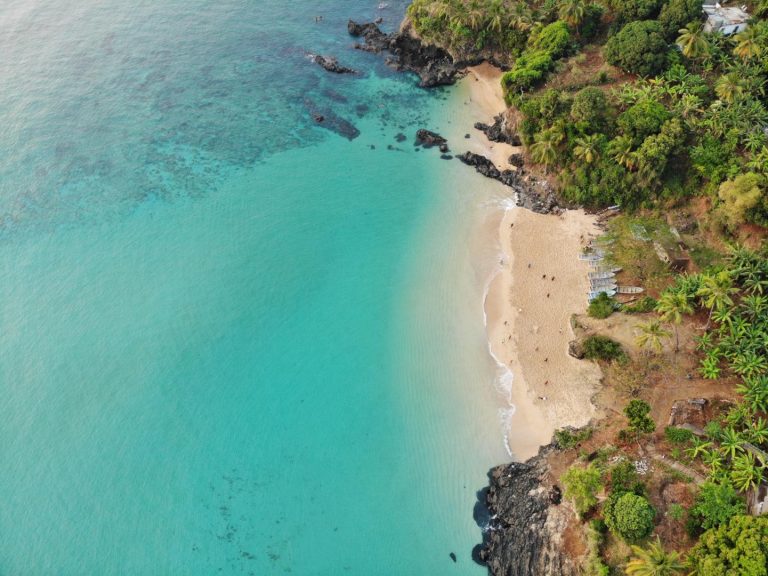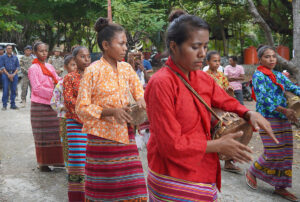Initially produced by a hatchery in the nearby town of Toliara, the sea cucumbers were grown on to commercial size in simple underwater pens in the remote village of Ambolimoke before being processed and exported to supply the bêche-de-mer market in Asia.
 Sea cucumbers, also known as sandfish, belong to the holothurian family of echinoderms, marine invertebrates related to starfish and sea urchins. Normally a common and placid inhabitant of the sea floor in tropical lagoonal environments, sea cucumbers filter their food from sand and sediment, thriving in shallow environments such as those found around the coasts of this Indian Ocean island.
Sea cucumbers, also known as sandfish, belong to the holothurian family of echinoderms, marine invertebrates related to starfish and sea urchins. Normally a common and placid inhabitant of the sea floor in tropical lagoonal environments, sea cucumbers filter their food from sand and sediment, thriving in shallow environments such as those found around the coasts of this Indian Ocean island.
Yet populations of this curious animal have plummeted throughout the world in recent years in response to rapidly growing market demand from southeast Asia, where the sandfish is prized for its alleged aphrodisiac properties.
On the wholesale market in Singapore sandfish can fetch up to 220 US dollars per kilogram, and prices regularly rise higher still with increased demand for the delicacy in the run up to the Chinese New Year.
The project is being run by Blue Ventures, a marine conservation organisation based in the region, as part of an effort to provide local indigenous Vezo communities with an alternative means of generating income to fishing. Fish stocks throughout the western Indian Ocean are plummeting as a result of coral reef degradation linked to over-fishing and climate change.
The pilot aquaculture project that supplied the juveniles to Ambolimoke’s experimental sea pens was initiated in January 2007 in partnership with the University of Toliara and local fisheries export company Copefrito. These partners, together with two Belgian universities, have since formed a private company Madagascar Holothurie, an enterprise working to cultivate larger quantities of juvenile sea cucumbers in vitro prior to transplantation to locally-owned village hatcheries like those in Ambolimoke.
Madagascar Holothurie aims to scale up production to 200,000 juvenile sandfish per year over the next 5 years and, through collaboration with NGOs like Blue Ventures, establish sea cucumber farming as a viable and lucrative new income for impoverished coastal communities.
“Sea cucumber farming provides an ideal alternative livelihood for the Vezo people as it is an activity that fits easily into their daily lives which are based around the sea” says Marine Scientist Georgina Robinson, coordinator of Blue Ventures’ aquaculture projects in Madagascar. “It’s relatively simple, with minimal labour and low capital investment, and has no adverse impact on the environment; in fact the pens also help to regenerate severely depleted natural populations of sea cucumbers”.
In late December 2008 a total of 160 sea cucumbers were harvested by the villagers of Ambolimoke and purchased by Madagascar Holothurie. The majority of the sea cucumbers had reached commercial size after only 11 months in the pens, with a survival rate of over 80%. The sea cucumbers were sorted into 4 size classes and transported to Toliara on ice for processing into bêche-de-mer, the end product used for export. This first experimental harvest is being used to gather data on the quality and yield of hatchery-produced sea cucumbers compared to wild sea cucumbers so that grades, prices and minimum harvest size can be established. Ambolimoke’s first finished product is now en route to Asia to test its suitability for the rewarding foreign market.
 This first harvest and sale is a remarkable success for the village of Ambolimoke, where most people live on less than 2 US dollars per day, and its success is paving the way for other communities to follow in their footsteps. Blue Ventures is now expanding its mariculture initiative in the region, and with the help of new funding from the European Union and ReCoMaP (Regional Programme for the Sustainable Management of the Coastal Zones of the Countries of the Indian Ocean Countries, 9th EDF), families in 4 villages will receive support to establish pens over the next two years.
This first harvest and sale is a remarkable success for the village of Ambolimoke, where most people live on less than 2 US dollars per day, and its success is paving the way for other communities to follow in their footsteps. Blue Ventures is now expanding its mariculture initiative in the region, and with the help of new funding from the European Union and ReCoMaP (Regional Programme for the Sustainable Management of the Coastal Zones of the Countries of the Indian Ocean Countries, 9th EDF), families in 4 villages will receive support to establish pens over the next two years.
In each village, families are supported with the construction of four pens over the first year. Each pen, which measures 12.5m square, is initially stocked with 300 juveniles. The cost of these juveniles is deducted from the sale price once the sea cucumbers have grown to maturity, so that any risk to communities is absorbed by Blue Ventures, which purchases the juveniles. The grow-out cycle takes approximately 12 months, and with stocking and subsequent harvesting occurring every 3 months, after the first year each pen will provide a family with a net revenue of 180 US dollars. This equates to an average income of 60 US dollars per month; approximately twice the average monthly wage in the region. By the end of 2010, it’s expected that over 750 people will benefit directly from income derived from this new activity.
ReCoMaP (www.recomap-io.org)
A regional programme for the sustainable management of the coastal zones of the countries of the Indian Ocean. It is an initiative of the Indian Ocean Commission, funded by the European Union, and it deals with seven countries of the region, namely Mauritius, the Seychelles, Madagascar, the Comoros Islands, Kenya, Tanzania and Somalia.
Blue Ventures (blueventures.org)
An award-winning not-for-profit dedicated to working with local communities in Madagascar to conserve threatened marine habitats and resources for the betterment of people and nature. Funded almost entirely through ecotourism revenue, Blue Ventures brings paying volunteers to project sites and trains them in scientific research, community outreach and on-the-ground conservation.























